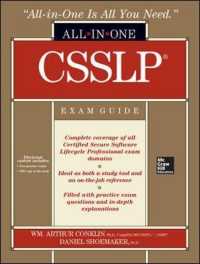- ホーム
- > 洋書
- > 英文書
- > History / World
基本説明
Explores five political tracts generally accepted as being the work of one of the key figures in British history, Alfred the Great.
Full Description
This book is a comprehensive study of political thought at the court of King Alfred the Great (871-99). It explains the extraordinary burst of royal learned activity focused on inventive translations from Latin into Old English attributed to Alfred's own authorship. A full exploration of context establishes these texts as part of a single discourse which placed Alfred himself at the heart of all rightful power and authority. A major theme is the relevance of Frankish and other European experiences, as sources of expertise and shared concerns, and for important contrasts with Alfredian thought and behaviour. Part I assesses Alfred's rule against West Saxon structures, showing the centrality of the royal household in the operation of power. Part II offers an intimate analysis of the royal texts, developing far-reaching implications for Alfredian kingship, communication and court culture. Comparative in approach, the book places Alfred's reign at the forefront of wider European trends in aristocratic life.
Contents
Acknowledgements; List of abbreviations; 1. Introduction; Part I. The West Saxon Political Order: 2. Resources and extraction; West Saxon resources and royal power; Military service and the common burdens; 3. Royal lordship and secular office-holding; The king's thegns; The royal household; Gifts and gift-giving; 4. Royal lordship and ecclesiastical office-holding; A new accommodation: royal monasteries and the council of Kingston (838); The southumbrian episcopate and the state of ecclesiastical discipline; Bishops as the 'best king's thegns'; Royal priests in the royal household; Frankish ecclesiastical conditions and Carolingian kingship; 5. The articulation of power under King Alfred's predecessors; Collective office-holding: West Saxon royal devotion; Royal office-holding: the first English coronation order; The uses of literacy?; Sources of textual culture (1) ecclesiastical communities; Sources of textual culture (2) the west Saxon royal household; 6. The impact of the Vikings; Logistics of defence; Lordship and manpower; Land and landholding; Royal income and urban development; Collective security (1) 'king of the Anglo-Saxons'; Collective security (2) 'ruler of all the Christians of the island of Britain'; Part II. Alfredian Discourse and its Efficacy: 7. The field of Alfredian knowledge; Alfredian innovation: Alfredian wisdom and the shift to vernacular prose; Intended audiences and the shift to vernacular literacy; Textual dissemination and the field of Alfredian knowledge; 8. The construction of Alfredian discourse; 'Royal' production: Alfredian discourse and its distinctiveness; Languages of office-holding (1) Georgian language; Languages of office-holding (2) Solomon's dream; The implications of Alfredian discourse; 9. Alfredian technology: books and aedificia; Books and book production; Candle-lantern, 'aestels' and the Fuller brooch; 10. The Hierdeboc as a treatise of power; Language and context; The origin and purpose of power; The active and contemplative lives; The hierdeboc and the southumbrian episcopate; 11. The Domboc as a Reorientation of royal law; Written law: authority and status; The construction of Alfredian judgement; The historical projection of secular law; The defence of lordship; The Domboc in practice; 12. Tribulation and triumph in the first fifty psalms; Apparatus and voice; God, rihtwisnes and sinful enemies; Royal hardships and divine justice; Alfred's psalms and Alfredian theatre; 13. The search for a satisfactory consolation; The consolatio philosophiae in context; Royal translation and Carolingian expertise; Alfredian adaption: mind, wisdom and the 'wordly blessings'; Craeft, tools and resources; Wyrd and divine justice; The Froferboc and Alfredian theatre; 14. Seeing God as he is; The Soliloquia in context; Royal translation and Carolingian expertise; Alfredian adaption: wisdom and the sight of God; Lordship and authority; Alfred's soliloquies and Alfredian theatre; 15. Conclusion; Appendix: West Frankish deployment of Solomon's dream; Bibliography; Index.







